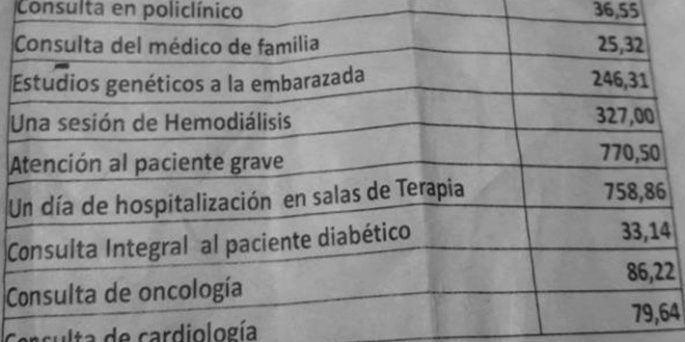
An editorial: Free health services
HAVANA. Recently, Cuban citizens have been reminded that medical services, though free of charge since the triumph of the Revolution in 1959, cost the government a lot of money. In addition to the signs in hospitals and clinics saying “Health care is free but costly,” the hospital discharge papers also itemize the costs for each procedure, for which we pay not a cent. That’s true and that’s how it should be. But, is it exactly so? We don’t pay?
This could be a dangerous idea for the country and its people. We have talked about this with many friends. The conclusion, and what we’ve all learned during decades in Cuba, is that free health care and education are a right, not a privilege. It’s a matter for the government, which quite rightly upholds what those rights cost. From a country like Cuba we can expect no less.
Precisely now, when we’re living in a recession more intense than in previous stages, with the exception of the Special Period, we wonder if Cubans haven’t paid and have paid for the maintenance of these services every time that they buy products in the Hard Currency Stores, known as TRDs.
Canada, for instance, which is not at all socialist, and other countries too, take pride in offering those services at no charge, given their economic potential and the strong tax policy that they impose on their citizens. But in Cuba, people pay as much as 240 percent in a sort of Value-Added Tax (IVA), one of the world’s highest, at every TRD.
True, nothing falls from the sky. Many of us Cubans have clearly understood this. While it’s good to know the cost of any medical service we receive, it would also be very useful and necessary to know the cost of producing a ton of sugar. Or the wholesale price of the bottles of soy or sunflower oil for which we pay 2.40 convertible pesos (=57.6 Cuban pesos). Also, the cost of the loss of tons of tomatoes in Guantánamo and what measures will be taken against the people responsible for this damage to the Cuban family table and to our economy.
For these reasons, we don’t think it necessary to be reminded about the cost of an X-ray of the lungs or a complex cardiovascular surgery or a nurse taking our pulse (25 cents?)
Our health-care system, which exports its services and charges for them to the point that they are the chief source of revenue to the country, also charges foreign people who come to Cuba for treatment and other medical procedures. But we also know that corruption has come to Cuban hospitals and that fees for cosmetic surgery are being charged “under the table” or “on the left,” as we say here.
There’s a difference between a breast implantation for a woman who simply wants a larger bosom and an implant for a survivor of breast cancer, and perhaps it would be a good idea to charge for the former. But legally.
Making public the cost of services is a duty of the state and a right of the citizens. But the state should also offer other information about the public accounts and it should open people’s minds to the new ways of acquiring and producing riches capable of sustaining a model as humanistic and irreversible as free health care and education.
In that case, there will be no need to mention to all those who contribute to the well-being of state and family the cost of a kidney ultrasound – or to remind them of it.

